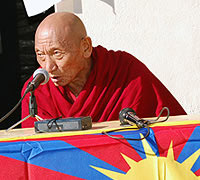
74-year old Ven. Palden Gyatso at start of the hunger strike in Torino, Italy. (Italia-Tibet)
The hunger strike, organized by the Tibetan Youth Congress and members of the Tibetan community in Italy, has run parallel to the XXth Olympic Games and drew attention to China’s dire human rights record and the IOC decision to award Beijing the XXIX Olympic Games.
ICT had joined with other Tibet support groups worldwide in calling on the IOC President, Jacques Rogge, to pay personal attention to the hunger strikers and to help process their demands. The IOC has long contended that awarding Beijing the 2008 Games would produce a marked improvement in China’s human rights record.
The hunger strike has been a non-violent last resort by three individual Tibetans who can see no indication that China intends to reverse its course in Tibet. Tibetans point to ample evidence of crackdowns on basic human rights, including freedom of expression and access to information, the enforced eviction of thousands of Beijing’s citizens to make way for Olympic venue construction, and the ongoing detention, imprisonment and torture of Tibetans and others for religious and other views that the Chinese Communist Party leaders are compelled to subvert and control.
ICT believes that the opportunity exists for China to take measures now that would protect human rights, address international outrage, and signal a more comfortable climate to athletes and spectators who plan to attend the 2008 Games. The IOC is in a unique position to act responsibly in this regard.
The three hunger strikers, including the 74 year-old Venerable Geshe Palden Gyatso, who was imprisoned by China for 33 years, have three demands:
That the IOC pressure China to improve human rights situation in Tibet and China.
That China disclose the details concerning the whereabouts of the Panchen Lama
That China unconditionally and immediately release all Tibetan political prisoners.
For more information, go to:

